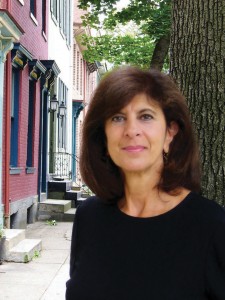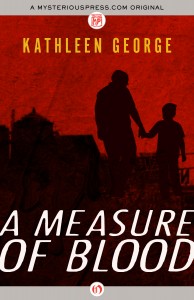The Scenic Detour to Being a Novelist

I wanted to be a writer. Always. Yet when I was graduating from college, I remember sitting on the steep back stairs to the yard of my family’s house in Johnstown, Pa, and thinking “I can’t do it. Who am I fooling? I could never be good enough to get published.”
It didn’t help that a faculty member had tried to discourage me—not because he thought I couldn’t write but because he thought writing would make me unhappy. He said, “Look at women writers. You’re not bad-looking enough to be a writer. They all look terrible and they’re very unhappy.” He implied I would never marry or find love if I pursued this ugly-making profession.
I sat on those back steps and decided I would take the invitation to join graduate school in theatre. Theatre, at least, wasn’t lonely. From painting scenery to doing coffee runs, there was group effort all around.
Little did I know as I directed plays, got an MFA, then a PH.D., that I was training to be a writer. Theatre, it turns out, is terrific training. You learn that every word counts, that there has to be a significant motivation for characters to do anything and there have to be obstacles. You learn that there needs to be enough at stake.
 And you learn that there must be a role for the audience. That is, the audience has to be engaged, either because they are dying to know what will happen next or because they know something a character doesn’t know and they are worried about that character’s finding out. You learn that people will fall asleep if the tension doesn’t mount. And you learn not to spend all the passion on the first moments because you have to keep building the scene. And then, in theatre, almost nothing that is said should be taken at simple face value. There is the subtext or the real meaning going on underneath.
And you learn that there must be a role for the audience. That is, the audience has to be engaged, either because they are dying to know what will happen next or because they know something a character doesn’t know and they are worried about that character’s finding out. You learn that people will fall asleep if the tension doesn’t mount. And you learn not to spend all the passion on the first moments because you have to keep building the scene. And then, in theatre, almost nothing that is said should be taken at simple face value. There is the subtext or the real meaning going on underneath.
Theatre takes energy and commitment to each moment. So does writing. Complex motives work best on stage. Ditto in novels. If a character is self-pitying, we lose pity. If that character soldiers through, we care deeply. On stage. On the page.
All that time, I was training. I didn’t know it. But the lessons stuck. One summer, with nothing to direct, I sat with a pen and paper and began to tell stories that sprang from my imagination. I tried various voices. I explored my history. I mined the stories of relatives. I did all the things new writers do.
One summer, I said to myself, “What would I write if I wrote something dramatic and highly plotted?” I started to make notes. The notes turned into paragraphs and then to pages. I called the police, then the FBI for information. Soon I had a lot of pages and eventually a novel. But it was as if all along I were directing scenes. I knew the staging, I saw it. I heard the voices as if I were coaching actors in those one-to one sessions I was known for.
Many doctors and lawyers and journalists write novels. And they have their ways into the craft. But an awful lot of novelists come from a theatre background as well. Storytelling gets into the blood and muscles as you work in theatre. You don’t want to waste an exit or an entrance. Those moments need to be sharp. They need to mean something.
Sometimes detours are the best way to get someplace.
—
Kathleen George is the author of A MEASURE OF BLOOD, just out, and the forthcoming novel THE JOHNSTOWN GIRLS, due in April. She is also the editor of PITTSBURGH NOIR. Previous novels are TAKEN, FALLEN, AFTERIMAGE, THE ODDS (Edgar finalist, best novel), HIDEOUT, and SIMPLE. She teaches theatre and writing at Pitt.
Follow her on twitter @Kathleen_George and visit her website www.kathleengeorge.com
Category: Being a Writer, Contemporary Women Writers, On Writing




In my novel, “Minerva’s Fox” (Two Harbors Press, 2015), it takes Malorie Ellsworth a year to figure out she’s not cut out for academia. Within months, she’s in France, working in a greenhouse, sorting herself out, discovering that her “hobby” (as her father puts it), drawing, and her love of gardens add up to garden design. And her career–and her life–takes off.
My decision to write this novel after a career in academia and publishing was my “ah, ha!” moment. In the short stories I’m working on now, false starts and second chances, secrets and betrayals revealed, show me daily how The Principle of Detour helps me create characters and make their stories sing.
As I wrote in a blog post, your story, apart from the academic track and of course personal details could’ve been mine Kathleen. I totally agree, no time was wasted. I look forward checking out your books, am following you on Twitter and have tagged you in my tweets and Scoop-it! your inspirational blog post. Your story made me share my own; playing dominoes with a positive ending.
What a fascinating detour Kathleen. Writing does indeed find us in many ways! I have always been a writer, though as a profession it was not deemed lucrative or the ‘normal’ thing to do. I have wandered many paths on my journey to publication, but would not change any of them. Each aspect of my previous careers have stood me in good stead as a writer, as your life in the theatre did for you. These past lives we lead give us life wisdom you cannot find in a text book. Thank you so much for sharing!
I agree with you completely, Kathleen. I was an English and Media teacher and Creative Writing lecturer before writing my first novel, and I continue to work as an examiner in Media Studies – all of these disciplines have taught me what it is to produce effective texts that grab their audiences and leave them satisfied. I have learnt so much about why some narratives work and what their building blocks are. I wouldn’t be the writer I am today without it.
Hi Kathleen, What a nice surprise to see your post on here. I interned for you when I was a Freshman at PITT in 2005, assisting with research on autopsies and DNA testing procedures and other such topics for Afterimage. I loved it. Anyway, just thought I’d say “Hello!” and that I enjoyed reading this post today. -Alexandra
What a wonderful detour. I find fascinating the ways that your life in the theatre was such great training for novel-writing. So many writers come at writing from various circuitous paths that I think that what may appear to be detours were the best possible path. Thanks for sharing!
I like hearing from people about the detours they take. And it’s really potent how one interaction can affect a person. Women really are more ready to take charge of their lives today–not always, but more often than before.
Well put, Kathleen. I can’t act to save my life but I do value my own detour via psychology. So interesting, the different paths we take
Sing it out! And use the detour. Thanks for responding.